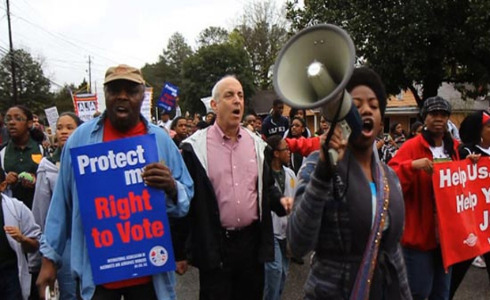
Reactions from Democrats in Georgia ranged from crestfallen to enraged in the wake of the Supreme Court’s decision to invalidate Section 4 of the Voting Rights Act Tuesday.
Democrats from around the state, including Atlanta Mayor Kasim Reed, Rep. John Lewis and Party Interim Chairwoman Nikema Williams, decried the 5-4 ruling in Shelby County v. Holder as a serious blow to voting rights and equity around the nation.
The Court struck down a portion of the Act that will effectively end the practice in which some states with a history of racial discrimination must receive clearance from the federal government before changing voting laws.
The change will allow such states to redraw districts without any further oversight from the federal government. The decision comes in the wake of mass claims of voter disenfranchisement from states including Florida, Georgia, Virginia and Ohio. Many said the decision could be disastrous.
“The Supreme Court decision in Shelby County vs. Holder is stunningly disappointing and ignores the clear intent of the United States Congress, which has enacted and repeatedly reauthorized the Voting Rights Act since 1965 by wide bipartisan majorities, reflecting the undeniable will of the people that each vote be counted regardless of whether it is cast by an ethnic minority,” said Reed in a statement.
Reed’s disappointment followed the tone of many in the Democratic Party as well as organizations like the NAACP, which earlier in the day released statements from top officials declaring their outrage over the verdict.
“This decision is outrageous,” said NAACP President and CEO Benjamin Todd Jealous. “The Court’s majority put politics over decades of precedent and the rights of voters.”
Lewis, a civil rights icon and longtime voting rights advocate, joined the dissent. He called the ruling “a dagger into the heart of the Voting Rights Act of 1965, one of the most effective pieces of legislation Congress has passed in the last 50 years.”
“I disagree with the court that the history of discrimination is somehow irrelevant today,” said Lewis. “The record clearly demonstrates numerous attempts to impede voting rights still exist, and it does not matter that those attempts are not as “pervasive, widespread or rampant” as they were in 1965. One instance of discrimination is too much in a democracy.”
In a press release, Lewis detailed a case in 2002 in Randolph County, Ga., where the first Black man ever was elected to the school board only to have his district changed by the county legislature to ensure he wasn’t elected again.
“As Justice Ginsberg mentioned, it took a Bloody Sunday for Congress to finally decide to fix on-going, institutionalized discrimination that occurred for 100 years after the rights of freed slaves were nullified at the end of the Civil War. I am deeply concerned that Congress will not have the will to fix what the Supreme Court has broken. I call upon the members of this body to do what is right to insure free and fair access to the ballot box in this country.”
Rep. Hank Johnson, representing Georgia’s Fourth District and based in DeKalb County, took the decision as a call to arms and promised he would begin work immediately on necessary legislation in Congress.
“The Court today engaged in historic overreach, ignoring their own precedents and disregarding evidence of ongoing discrimination at the polls,” said Johnson. “A call for strong, swift action by the Congress is now front and center. I will work with all my colleagues, on both sides of the aisle, to ensure voters have every necessary protection…The Voting Rights Act is as necessary today as it was almost 50 years ago.”
In addition to mourning the loss of Section 4 of the Act, many cited the invalidation of Section 5 the decision would force.
“It is unfathomable to me that our High Court would disenfranchise so many citizens,” said Williams, the interim leader of the Georgia Democratic Party. “With a stroke of a pen, the Court has essentially invalidated Section 5 of the Voting Rights Act.”
According to Williams, the necessity of the VRA’s fourth and fifth sections was demonstrated in Georgia as recently as the 2012 election.
“The Republican Majority in Georgia drew maps in 2012 that reduced Democratic voting performance,” she said. “Georgia is nearly 50 percent Democratic and they diminished our voting strength to 32 percent through gerrymandered maps. However, today’s Supreme Court ruling may backfire when Democrats across the state rally. Enough is enough.”
